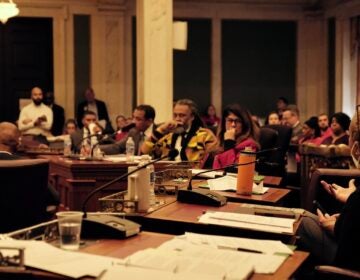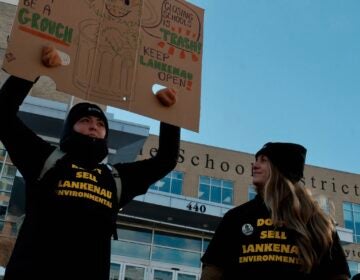Meet the finalists: What Philly’s 3 superintendent hopefuls said during their job interviews
All three candidates for Philly’s top schools job visited the city this week for their public vetting. A final decision is just around the corner.
Listen 5:11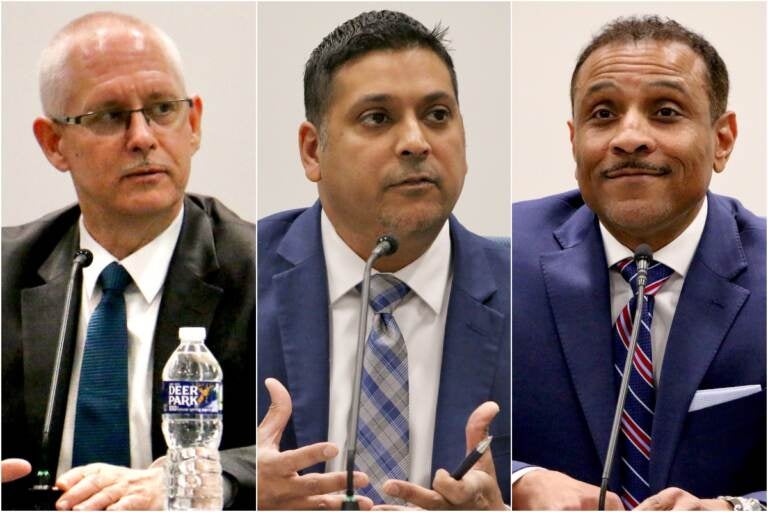
The three candidates being considered the Philadelphia schools superintendent job (from left) John L. Davis, Jr., Krish Mohip, and Tony Watlington Sr. meet with Philadelphia teachers and principals at the school administration building. (Emma Lee/WHYY)
The three finalists to lead Philadelphia’s public school system visited the city this week, meeting with parents, students, educators, and the larger public in a series of roundtables and town halls.
The city’s school board expects to choose a replacement for Superintendent William Hite sometime next week. He is stepping down at the end of the school year, after a decade at the helm of the 120,000-student district.
Questions about boosting transparency, equity, student performance, and teacher morale dominated the meetings. Participants also asked about the candidates’ leadership styles, and what motivated them to apply for the job.
Some expressed disappointment that none of the finalists are women — given that women make up the majority of the education field — and that none come from Philadelphia. Each candidate committed to learning all they could about the city, if selected for the job.
Here’s more about each finalist:
John Davis, Chief of Schools, Baltimore City Public Schools
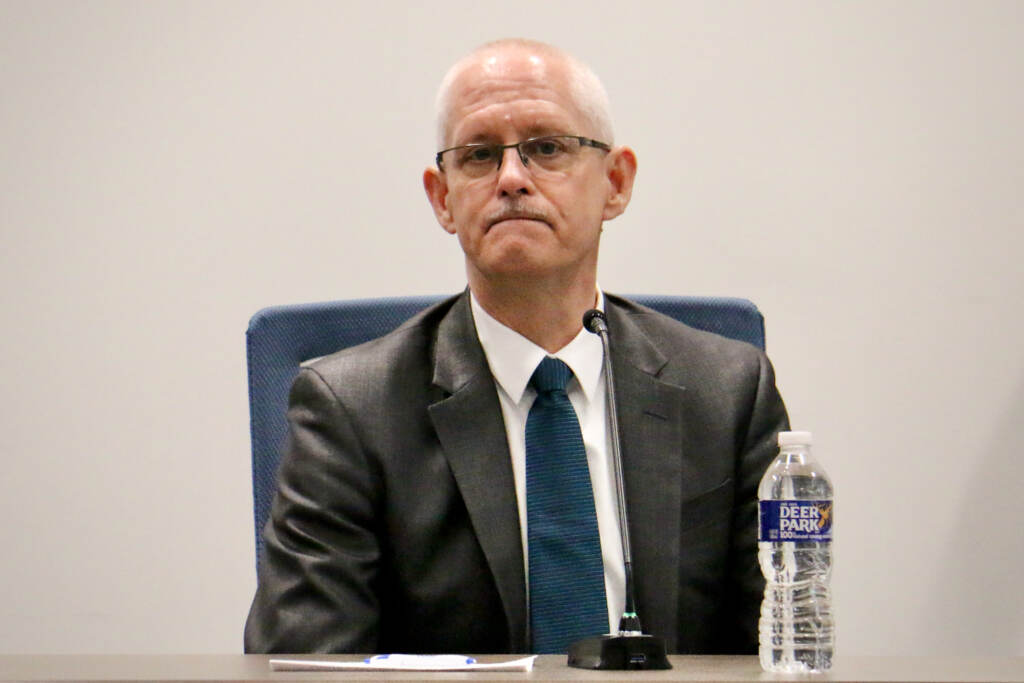
John Davis has three decades of experience in school districts with similar demographics to Philadelphia’s, and hopes to bring that experience to the city’s schools.
“There is synergy between what I’ve seen in D.C. and Baltimore and the opportunity and challenges that are facing the students in the community here in Philadelphia,” Davis said during a town hall on Monday night.
Davis is chief of schools for Baltimore City Public Schools, which “basically means that principals [and their supervisors] report to me,” he said, effectively serving as second-in-command to the superintendent. The district serves 78,000 students.
Davis said he went through a “kind of normal progression” throughout his career in education, starting off as a middle school math teacher in D.C. Public Schools and rising through the ranks to become a principal and central office administrator.
During his tenure in D.C., graduation rates steadily rose and the district led the nation in reading and math and reading growth on the 2013 and 2015 National Assessment of Educational Progress, according to his candidate bio.
At a parent roundtable, one mother asked Davis how he would rebuild trust in a district that had, in her words, “operated and made critical decisions impacting our children without transparency, inclusion, and effective communication.”
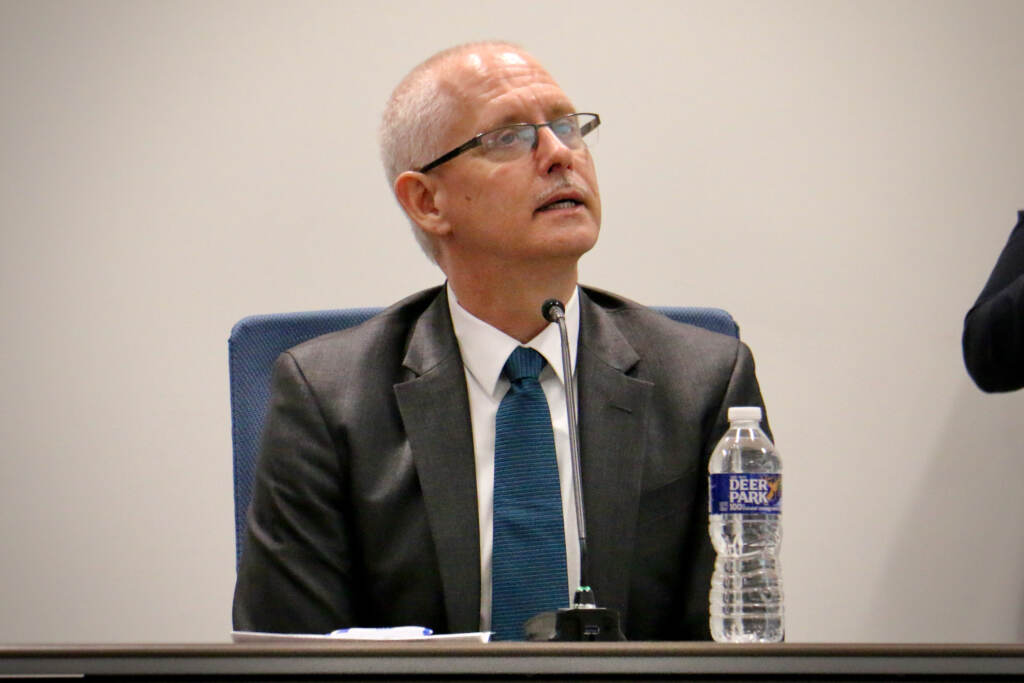
Davis provided an example from his time in Baltimore, when the city’s largest public high school went through four principals in four years. He took a stronger role in the school community, explaining what happened and what the process to hire a new leader would look like.
“You have to own the decision and explain it and then work very hard to make it right,” Davis said. “The best that we can do and the best that I will always do is to be clear about what we’re going to do moving forward.”
Davis was also asked how he would retain teachers and address burnout more than two years into the pandemic. He said that teachers need more time and space, and noted that Baltimore added extra half days for teachers this school year.
“Not time to say, ‘You gotta go to this professional development,’ but literally time for them,” Davis said. “We all know that students are who we’re here to serve, but there are times when you have to change and be flexible as a leader and listen to teachers and make those types of changes.”
Parents and students both brought up the revamped admission process for Philadelphia’s selective schools. This year, the district shifted to a centralized lottery system. Officials said the goal was to create a more equitable process, but some families pushed back against the change.
“How important is it to achieve equity without sacrificing meritocracy?” one parent asked.
Davis said the “first order of business” is “getting more kids into those schools, or having the opportunity to, because they’ve been well-educated.” He added that he would “lean a bit towards the equitable way of thinking about it because, frankly, there are too many students that come from disinvested areas that just don’t have that opportunity. We’ve got to open it up and give them that opportunity.”
When it comes to charter schools, Davis said he is “not necessarily pro-charter or anti-charter,” but instead “pro-good school and anti-school that isn’t welcoming, safe, and challenging to students.” He added that charter schools have to be held accountable for their outcomes.
One community member asked how Davis — the only white finalist — would lead a district in a “majority-minority city.”
“As a country we have not done right by Black people for a long, long time,” Davis said. “We all know this history. I’m not afraid of it. But at the same time, I am always aware of it, and I always feel like I have to bring my best and I have to prove myself every single day.”
Davis said he was attracted to the Philadelphia superintendent job, in part, because “the board has had the guts” to put out measurable goals and guardrails for student achievement, school conditions, and more.
“A lot of places don’t want to put out goals, they just want to do school and whatever happens is whatever happens,” Davis said. “But when you put out goals to say more of our young people should be reading at grade level and should be computing and thinking and writing at grade level, that gives me hope.”
Davis stressed that he is “first and foremost” the father of two sons who graduated from D.C. public schools and a daughter who attends middle school there.
If selected as superintendent, his daughter would remain in the D.C. school system, but Davis said he is committed to bringing his leadership experience to Philadelphia while also learning everything he can about the city.
Krish Mohip, Deputy Education Officer, Illinois State Board of Education
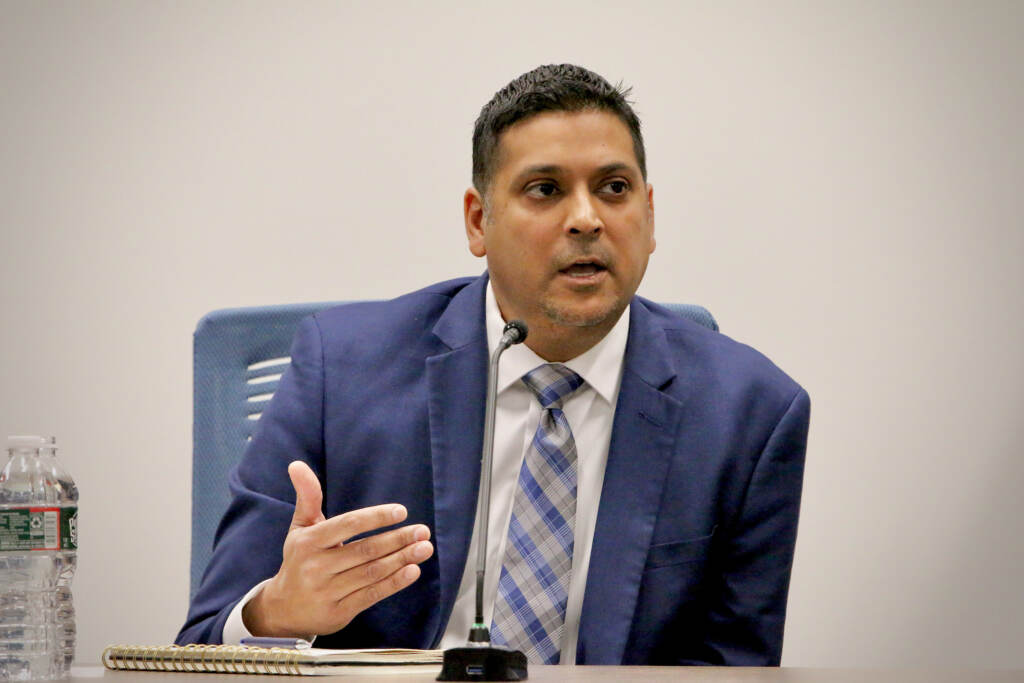
Krish Mohip said he is clear-eyed about the task ahead, if he is selected as the city’s next superintendent.
“I know coming to Philadelphia will be a challenge,” Mohip said at a town hall on Tuesday night. “I was talking to my wife and, honest to God, I said I feel like if I get this job I’ll be going into battle. But it’s a battle worth fighting. We’re talking about making generational change.”
Mohip started his career as a kindergarten teacher in Chicago, rising through the ranks to become a principal and, eventually, Chief of Schools. At one point, he was tasked with improving performance at the district’s 36 “most challenged” schools.
He later served as CEO of schools in Youngstown, Ohio from 2016-2019, a tenure that he described as “very tense.”
Mohip was brought in as part of a state takeover of the district, which had been identified as “failing.” In his role, he had the power to bypass the school board and union contracts.
Teachers and some school board members opposed the takeover. Mohip said he walked into a district where he was not wanted. He left before his contract expired.
Mohip said while he “wasn’t crazy about” taking a position as head of a state-controlled district, he was driven by a desire to help students succeed.
“The only reason that I took that job was because I saw what was happening for children that were going to the Youngstown City Schools,” he said, citing low academic performance.
During his time in the district, graduation rates rose and there was a jump in the percentage of ninth graders considered “on track, according to his candidate bio.” He also worked to reduce the high suspension and expulsion rates in Youngstown schools by “wrap[ping students] in supports.”
While discussing his stint in Youngstown, Mohip insisted he is a “strong advocate for public education” and for union labor.
He described his educational philosophy as believing that “all children can learn, all children want to learn, and it’s up to the adults to make it happen.” He added that one of his key priorities in the district would be ensuring that students read at grade level.
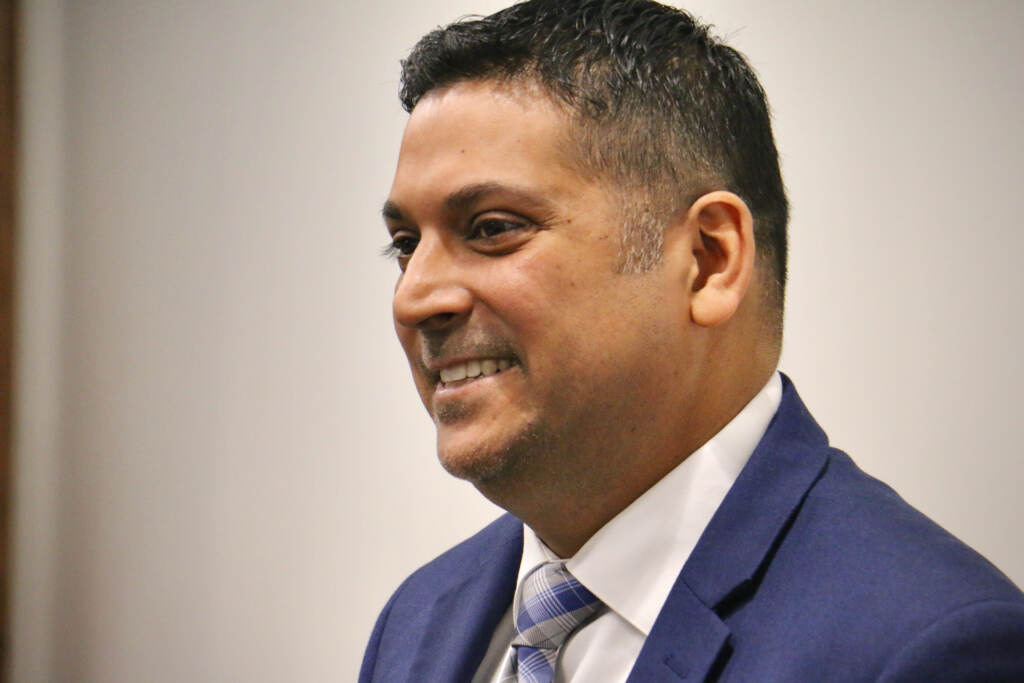
Asked about rebuilding trust in the district — and boosting teacher morale — Mohip described himself as “transparent and honest,” and said that he is a “big believer in organizational health.” His administration could put the best instructional framework and strategic plan in place, but “if the culture is wrong, none of that’s going to work.”
He also acknowledged that “teachers’ morale has been beaten down” during the pandemic, “and it’s going to take time to build that back.”
When it comes to charter schools, Mohip said that initially, as a principal and district leader, he saw them as competition. Now, however, his thinking has evolved.
“I don’t think a child cares what governance structure a school [has],” he said. “What they care about is that they’re in a good quality school.”
Mohip, the child of immigrants from Trinidad and Tobago, said he can relate to struggling students, in part because of his own experience with trauma.
“Two weeks before I started high school, my sister suddenly died,” he said. “I went to high school with depression. [I] did not necessarily care for school.”
He credits a school counselor with getting him on track, leading to his conviction that you have at least one person connected to every single child in school.”
Mohip said, if chosen for the superintendent job, he would send his three children to district schools.
“I want them to build roots in Philly,” he said. “This is not a stepping stone to somewhere else.”
Tony Watlington, Superintendent, Rowan-Salisbury Schools in North Carolina
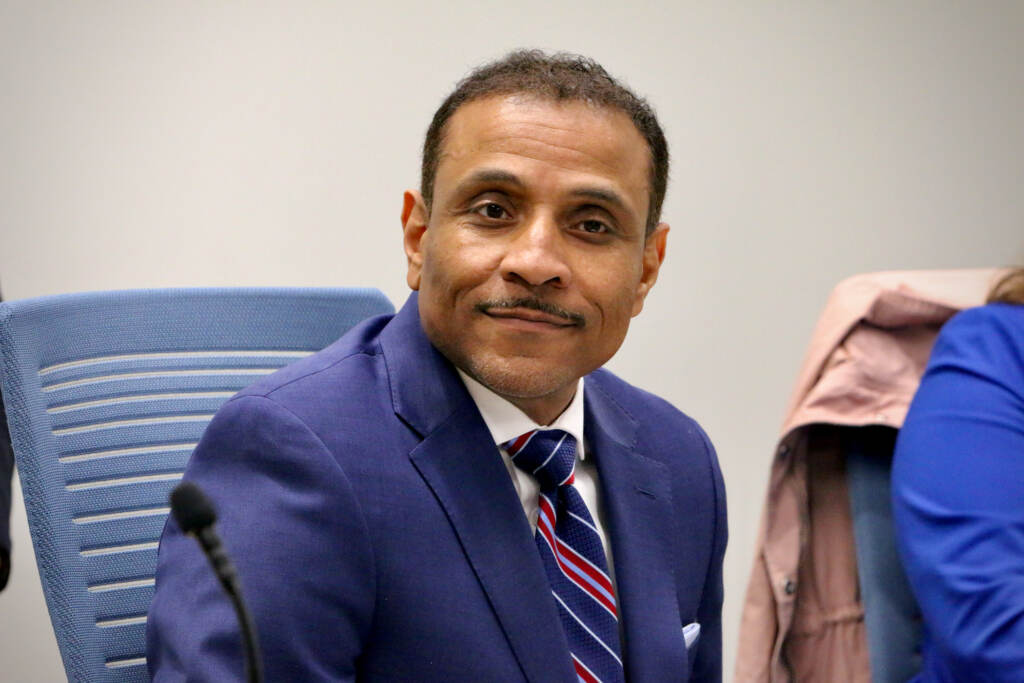
For Tony Watlington, the superintendent of Philadelphia schools is “one of the most important jobs in the United States of America.”
This is the city where the Declaration of Independence was signed, he said. Now, he wants to help with the “unfinished work” of that document; ensuring that every child has access to an excellent education.
Watlington leads a North Carolina district with more than 18,000 students. It is the state’s only “renewal” district, with flexibility around budgeting, curriculum, calendar and hiring decisions.
During his tenure, Watlington said, Rowan-Salisbury’s third-grade literacy ranking improved from 96th to 74th among the state’s 115 school districts, according to his candidate bio. The percent of district schools that meet or exceed state growth targets also increased.
Before taking charge of his current district, Watlington served as chief of schools for Guilford County Schools, the third-largest district in North Carolina.
Watlington said he started his career as a bus driver and custodian, working his way up to become a principal and central office staffer. That journey, he said, has served him well as a leader.
“I know how to work with people at all levels of this organization,” he said.
And as a “free-and-reduced lunch kid, a poor kid,” he knows the importance good schools and strong teachers can make in students’ lives.
Watlington believes the “number one ingredient” to raising student achievement is “high-quality teachers,” and that it’s critical for the district to recruit, develop, support, and retain them.
“We can’t remediate or tutor our way to excellence,” he said. A rigorous curriculum and “strong, effective” principals are also key to student growth, he added.
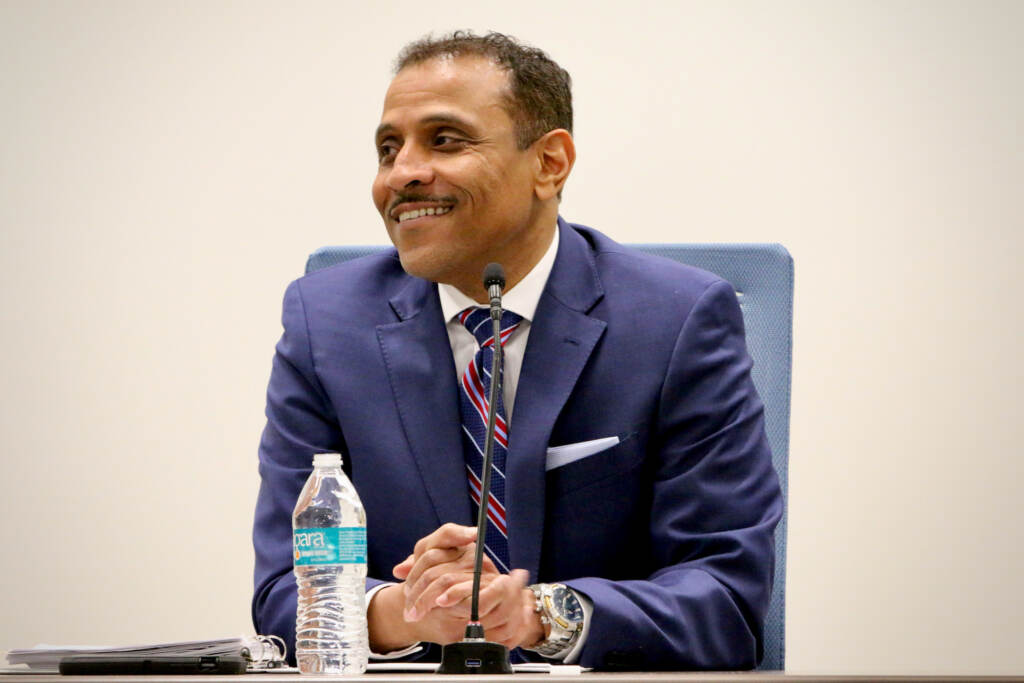
As superintendent, Watlington would hope to help “grow a cadre” of Black and brown educators by identifying students who express an interest in teaching as early as middle school and supporting and investing in their development.
“We ought to pay their way to go to the university of their choice,” Watlington said. In exchange, he said, they could agree to teach in the district for four years.
Like the other finalists, Watlington was asked about his approach to rebuilding trust in the district.
“I’m one of those leaders that likes to put my cards on the table face up,” Watlington said. “I don’t have anything to hide.”
He added that he sees trust as “the cumulative effect of small acts,” and he would work to develop trust relationships over time.
During a student roundtable, a 12th grader said she feels like there is an “us versus them mentality” between charter and traditional public school students, and asked what Watlington would do to “ensure that all youth of the district feel equally valued and supported.”
He said that every student deserves a great school with excellent teachers, that “there’s more than one day to do that,” and that he believes there is “an appropriate role for choice for families.” Watlington said he would focus on “how we work together to get to the outcome of a great school for all students close to their neighborhoods.”
Watlington was also asked about the “innovative work” he has done in his own district, and said that his team is developing “competency-based education,” where students move at their own pace, “instead of warehousing kids through 12 years of education.”
Watlington asked whether a grade, and school year, needs to be 180 days for every student.
“Who’s to stay it shouldn’t be longer?” he asked. “Maybe it should be shorter for some students.”
During a roundtable for teachers and principals, one educator brought up the fact that Watlington has only worked in smaller districts, in a right-to-work state.
“My concerns would be that you do not have experience with unions and that you have not been in a giant district like this,” she said.
Watlington said he believes that school improvement strategies are “scalable,” and that, while he has not worked in a district with collective-bargaining unions, he does have experience bringing “diverse groups of people together to work around big, tough problems.”
“I am not Pollyanna-ish” or naive about the “challenges and opportunities” of working in a large district and with unions. But he stressed that he sees unions as a good thing — “as American as blue jeans and apple pie” — and feels confident in his ability to lead Philadelphia schools.
Ultimately, Watlington — a father of three, the youngest a 17-year-old — said he believes the School District of Philadelphia can be a “national beacon of hope … that says this is how a majority Black and brown school district ensures that all students understand and experience what academic excellence looks like.”
He said we would like to be a partner “in doing just that work.”
WHYY is your source for fact-based, in-depth journalism and information. As a nonprofit organization, we rely on financial support from readers like you. Please give today.







